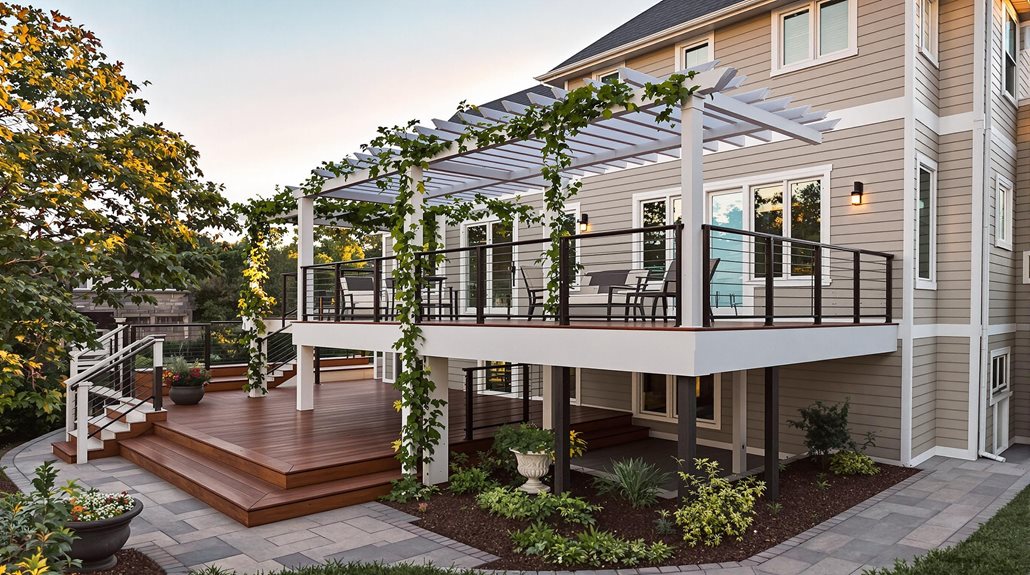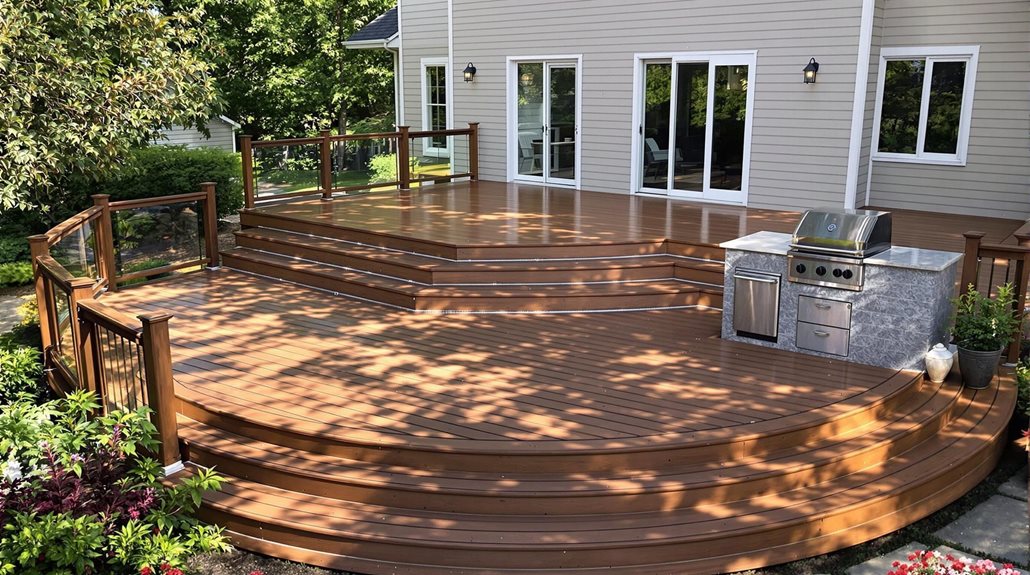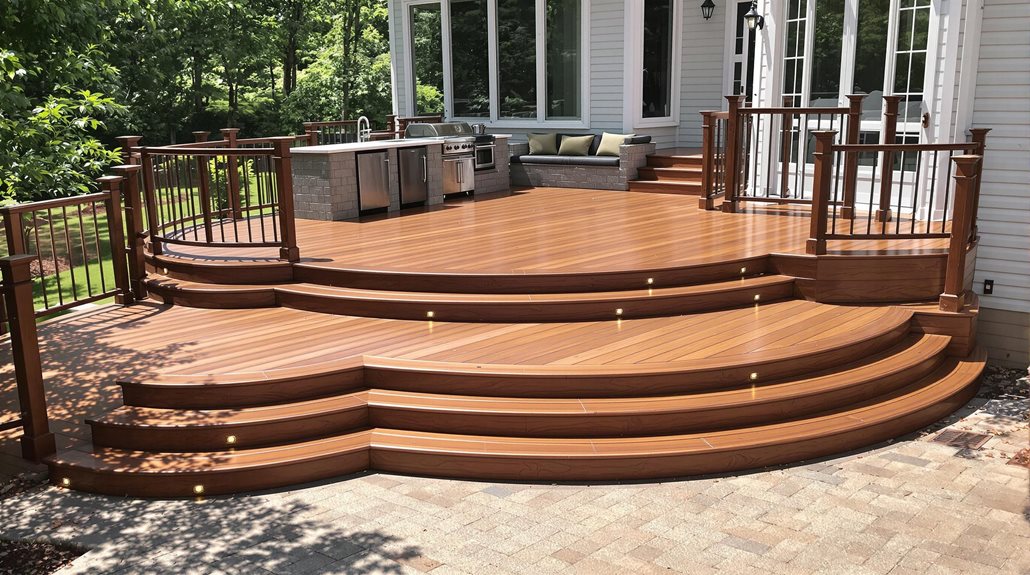Investment Guide: Custom Deck Design ROI for Your Home Value
Investing in a custom deck design can greatly enhance your home's value, offering a potential return on investment of up to 70% at resale. To maximize this ROI, consider the intended use and layout of your deck, selecting materials that balance maintenance, budget, and environmental impact. High-quality materials like durable hardwoods and composite options like Trex, along with aesthetic elements such as curved designs and energy-efficient lighting, can increase both immediate enjoyment and long-term value. By optimizing your deck design with these factors in mind, you can enhance your home's appeal and resale potential. For more detailed strategies on how to achieve this, explore further insights into custom deck design.
Expert Highlights
- Custom decks can increase home resale value by up to 70%, depending on design and materials.
- High-quality, durable materials like hardwoods and composite options maximize ROI.
- Designing for multiple functions (e.g., dining, lounge, entertainment) enhances usability and buyer appeal.
- Incorporating aesthetic elements such as curved or multi-level designs and energy-efficient lighting boosts visual appeal.
- Sustainable and low-maintenance materials contribute to long-term value and eco-friendliness.
Factors to Consider in Custom Deck Design

When commencing on a custom deck design project, several key factors must be carefully considered to guarantee the final product meets both aesthetic and functional expectations.
One of the primary considerations is the intended use of the deck. Will it be a dining area, a lounge space, or an entertainment hub? This determines the layout, size, and features such as seating areas, built-in planters, or outdoor kitchens.
Another critical factor is the material selection. Choices range from traditional wood to durable composites and sustainable options like bamboo. Each material has its own set of benefits and drawbacks, including maintenance requirements, budget implications, and environmental impact.
Additionally, integrating the deck with the existing architecture of the home is essential for a cohesive look. This involves considering color schemes, architectural styles, and connecting elements like stairs and railings to guarantee a seamless integration that enhances the overall appeal of the property.
Our expert team at Elk River location specializes in creating personalized deck solutions that transform your outdoor space into a true extension of your home.
Cost-Benefit Analysis of Custom Decks
Initiating a custom deck design project involves a significant financial investment, making a thorough cost-benefit analysis essential. Homeowners must weigh the initial costs against the potential long-term benefits. The primary challenge is balancing the expense of materials, labor, and design with the anticipated increase in property value and personal enjoyment.
To conduct a cost-benefit analysis, homeowners should first estimate the total cost of the project, including materials, labor, and any necessary permits.
Next, they should consider the potential return on investment (ROI) through increased property value and resale appeal. Custom decks can recoup up to 70% of their cost at resale, according to some studies.
Additionally, a well-designed deck can enhance outdoor living spaces, providing years of family enjoyment and social benefits. By carefully evaluating these factors, homeowners can make informed decisions that maximize both financial and personal value.
A sustainable deck material selection can further increase long-term value by reducing maintenance costs while supporting eco-friendly building practices.
Maximizing ROI Through Design and Materials

Maximizing the return on investment (ROI) of a custom deck design hinges on careful consideration of both the design elements and the materials used. A well-designed deck can considerably enhance the aesthetic and functional value of a home, but it must be balanced with cost-effective choices to maximize ROI. Premium materials like Trex and Timbertech offer superior durability while maintaining visual appeal for outdoor spaces.
Design Elements and Materials Comparison
| Design Element | High ROI Option | Low ROI Option |
|---|---|---|
| Deck Shape | Curved or multi-level decks that add visual interest | Simple rectangular decks |
| Materials | Durable hardwoods like cedar or ipe | Pressure-treated pine |
| Railings | Glass or cable railings for unobstructed views | Traditional wood railings |
| Lighting | Solar-powered or LED lighting for energy efficiency | Incandescent lighting |
| Finishes | Low-maintenance finishes like composite materials | High-maintenance finishes like natural wood stains |
Using high ROI options in design and materials can guarantee that your custom deck not only enhances your home's value but also provides long-term durability and minimal maintenance costs.
Impact on Home Resale Value
The addition of a custom deck can greatly impact the resale value of a home, as it often serves as a key selling point for potential buyers.
A well-designed deck can enhance the exterior appeal of the property, creating an inviting outdoor living space that prospective buyers can envision themselves using. However, a poorly designed or low-quality deck can deter buyers and potentially lower the home's value.
To maximize the resale impact, homeowners should focus on using high-quality materials and incorporating features that align with current trends and local preferences. For instance, adding a built-in seating area or an outdoor kitchen can notably enhance the deck's appeal.
Choosing composite deck materials can provide lasting value through their exceptional durability and minimal maintenance requirements.
Tips for Optimizing Your Deck Investment

When considering a custom deck design, homeowners often face the challenge of guaranteeing their investment yields the highest possible return. To optimize this investment, several key factors must be considered. Cedar decking materials provide an excellent balance of natural beauty and durability for long-term value.
Tips for Optimizing Your Deck Investment
| Tip | Description | Benefit |
|---|---|---|
| Choose Durable Materials | Select materials like composite decking or hardwood that are resistant to weather and maintenance. | Long-lasting, low maintenance, and cost-effective in the long run. |
| Design for Functionality | Make certain the deck is designed with multiple uses in mind (dining, lounging, entertaining). | Increases usability and appeal to potential buyers. |
| Incorporate Aesthetic Elements | Add features like railings, lighting, and planters to enhance the visual appeal. | Enhances curb appeal and creates a welcoming atmosphere. |
Frequently Asked Questions
How Long Does a Custom Deck Typically Last?
A custom deck typically lasts between 15 to 30 years, depending on the materials used, maintenance, and environmental conditions. Well-maintained decks made from durable materials like hardwood or composite can last longer than those made from softer woods.
Can I Build a Custom Deck Myself to Save Money?
Building a custom deck oneself can be a cost-effective option, but it requires significant time, skill, and resources. Proper planning, materials, and execution are essential to guarantee safety and durability. DIY projects may also affect warranty and resale value.
What Are the Local Building Codes for Custom Decks?
Local building codes for custom decks vary by jurisdiction and typically include specifications for structural integrity, safety features, and materials. Homeowners should consult their local building department to guarantee compliance with all relevant regulations.
How Often Should I Maintain My Custom Deck?
Regular maintenance is essential for a custom deck. Inspect it annually for damage, rot, and loose boards. Clean the deck seasonally to prevent dirt and mildew buildup. Apply a protective sealant or stain every 2-3 years to maintain its integrity and appearance.
Can a Custom Deck Be Built in Any Weather Condition?
A custom deck can be built in various weather conditions, but extreme weather such as heavy rain, intense heat, or freezing temperatures can hinder the construction process and affect the quality of the build. Ideal conditions are generally mild and dry.
Expert Final Thougts
Investing in a custom deck design can greatly enhance your home's value and appeal. By considering factors such as materials, layout, and integration with existing architecture, you can maximize your return on investment. A well-designed deck not only adds aesthetic value but also increases the functionality of your outdoor space, making it a desirable feature for potential buyers. This thoughtful approach guarantees that your deck investment pays off both with regard to immediate enjoyment and long-term resale value.



